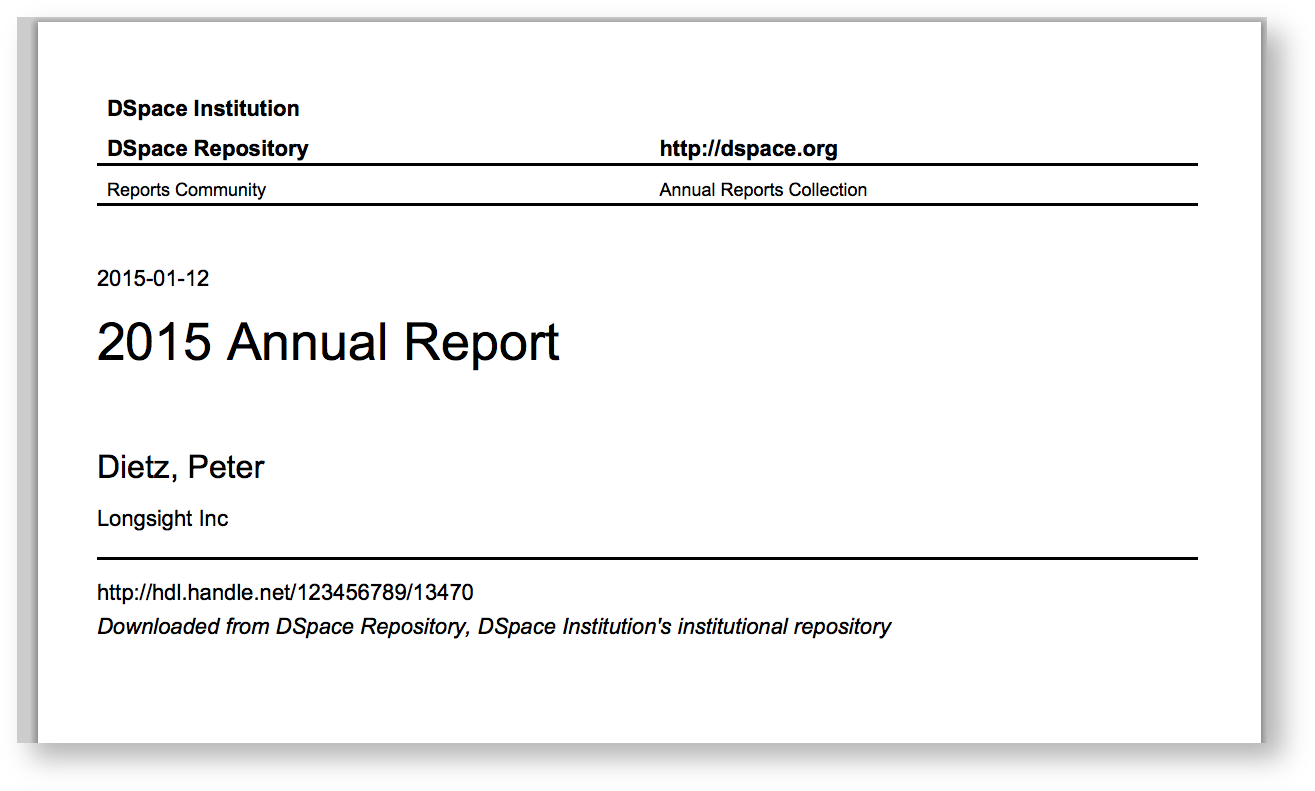Old Release
This documentation relates to an old version of DSpace, version 6.x. Looking for another version? See all documentation.
Support for DSpace 6 ended on July 1, 2023. See Support for DSpace 5 and 6 is ending in 2023
Enabling PDF Cover Pages may affect your site's visibility in Google Scholar (and similar search engines)
Google Scholar specifically warns against automatically generating PDF Cover Pages, as they can break the metadata extraction techniques used by their search engine. Be aware that enabling PDF Cover Pages may also cause those items to no longer be indexed by Google Scholar. For more information, please see the "Indexing Repositories: Pitfalls and Best Practices" talk from Anurag Acharya (co-creator of Google Scholar) presented at the Open Repositories 2015 conference.
A known issue with the current implementation of the PDF Citation Cover Page is that primarily only English/Roman characters are supported. This is due to a limitation in the tool used to generate PDFs. See DS-2224 for more details on this issue
Adding a cover page to retrieved documents from DSpace that include additional citation information has been sought, as documents uploaded to the repository might have had their context stripped from them, when they are just a PDF. Context that might have surrounded the document would be the journal, publisher, edition, and more. Without that information, the document might just be a few pages of text, with no way to piece it together. Since repository policy might be to include this information as metadata to the Item, this metadata can be added to the citation cover page, so that the derivative PDF includes all of this information.
The citation cover page works by only storing the original PDF in DSpace, and then generating the citation-cover-page PDF on-the-fly. An alternative set up would be to run the PDF Citation Coverpage Curation Task on the DSpace repository contents, and then disseminate the pre-generated citation-version instead of generating it on the fly.
Configuration settings for Citation Cover Page
Configuration file renamed to citation-page.cfg and configurations names have changed
As of DSpace 6.0, the configuration file for this feature was renamed from disseminate-citation.cfg to citation-page.cfg. The renaming was to clarify the purpose of this configuration file, as its previous name was misleading / confusing to some users.
In addition, all configurations below have now been prefixed with "citation-page" (e.g. the enable_globally configuration has been renamed to citation-page.enable_globally)
In the {dspace.dir}/config/modules/citation-page.cfg file review the following fields to make sure they are uncommented:
Property: | citation-page.enable_globally |
|---|---|
Example Values: | citation-page.enable_globally = true |
Informational Note: | Boolean to determine is citation-functionality is enabled globally for entire site. This will enable the citation cover page generator for all PDFs. Default: disabled |
Property: | citation-page.enabled_collections |
Example Values: | citation-page.enabled_collections = 1811/123, 1811/234 |
Informational Note: | List of collection handles to enable the cover page generator for bitstreams within. Default: blank |
Property: | citation-page.enabled_communities |
Example Values: | citation-page.enabled_communities = 1811/222, 1811/333 |
Informational Note: | List of community handles to enable the cover page generator for bitstreams within. Default: blank |
Property: | citation-page.citation_as_first_page |
Example Values: | citation-page.citation_as_first_page = true |
Informational Note: | Should the citation page be the first page cover (true), or the last page (false). Default: true, (first page) |
Property: | citation-page.header1 |
Example Values: | citation-page.header1 = University of Higher Education |
Informational Note: | First row of header, perhaps for institution / university name. Commas separate multiple sections of the header (see screenshot above) Default Value: DSpace Institution |
Property: | citation-page.header2 |
Example Values: | citation-page.header2 = Scholar Archive\, http://archive.example.com |
Informational Note: | Second row of header, perhaps put your DSpace instance branded name, and url to your DSpace. A comma is used to separate instance name, and the URL Default Value: DSpace Repository, http://dspace.org |
Property: | citation-page.fields |
Example Values: | citation-page.fields = dc.date.issued, dc.title, dc.creator, dc.contributor.author, dc.publisher, _line_, dc.identifier.citation, dc.identifier.uri |
Informational Note: | Metadata fields to display on the citation PDF. Specify in schema.element.qualifier form, and separate fields by a comma. If you want to have a horizontal line break, use _line_ Default Value: dc.date.issued,dc.title,dc.creator,dc.contributor.author,dc.publisher,_line_,dc.identifier.citation,dc.identifier.uri |
Property: | citation-page.footer |
Example Values: | citation-page.footer = Downloaded from Scholar Archive at University of Higher Education\, an open access institutional repository. All Rights Reserved. |
Informational Note: | Footer text at the bottom of the citation page. It might be some type of license or copyright information, or just letting the recipient know where they downloaded the file from. Default Value: Downloaded from DSpace Repository\, DSpace Institution's institutional repository NOTE: any commas appearing in this text should be escaped as "\,". See example above. |
